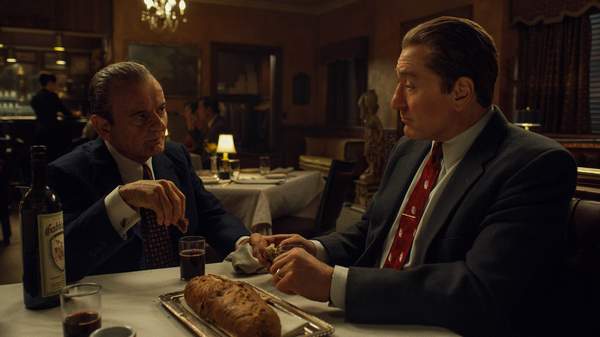Overview
Is Martin Scorsese cinema's foremost purveyor of pissing contests? In the posturing men that fill the filmmaker's frames, penis-measuring and ego battles keep bubbling up. The urge to assert one's superiority and claim one's domain pulsates through gangster classics such as Mean Streets, Goodfellas and The Departed. It's also evident in The Wolf of Wall Street, which takes aim at the need to one-up everyone and everything. But, spread across six decades and told with a deeply melancholy sense of contemplation, this notion seeps through The Irishman with particular weight and purpose. It's impossible not to notice it when, surrounded by mob heavies on one side and a corrupt labor union leader on the other, the film's central hitman observes these two opposing forces agitating for supremacy — by any means possible, and frequently to their own detriment.
That hitman is Frank Sheeran (Robert De Niro), after the World War II veteran-turned-truck driver crosses paths with Russell Bufalino (Joe Pesci). Taken under the crime boss's wing, he rises through the ranks as far as any non-Sicilian can — becoming, at his mentor's behest, the mob's conduit to outspoken Teamsters head Jimmy Hoffa (Al Pacino). Adapted by Steven Zaillian (The Night Of) from Charles Brandt's 2004 non-fiction text I Heard You Paint Houses, Scorsese's film is told from the octogenarian Sheeran's perspective, as he reflects on his life's volatile ups and downs while remembering a pivotal road trip, and the events that led to it. It's no spoiler to say that, in bookending scenes, he's whiling away his remaining days in a nursing home. And even if you don't know your 20th century American history, it's no spoiler to say that Sheeran's cronies don't all enjoy the same fate.
Sometimes, Scorsese introduces bit-players via text outlining their name, date of death and its cause, stressing the cutthroat nature of the gangster world. In the process, he illustrates the cost of behaviour that's as common as breathing in The Irishman, and that his protagonist becomes accustomed to. As Sheeran progresses from stealing steaks to grease mob wheels, to "painting houses" (read: killing), to taking on a union role to help control the headstrong Hoffa, he's thrust into the thick of ego-driven conflict. He not only adapts, but prospers at the expense of many a life, with this violent true tale doubling as an indictment of the destructive deeds and mindsets that remain baked into society.
It's telling that, when a remorseful Sheeran finally confronts the fallout from these constant power struggles, he's no longer cool, calm and collected. It's just as potent when, after seeing her dad at his worst, his daughter Peggy (played by Lucy Gallina as a child and Anna Paquin as an adult) makes the movie's biggest statement by shunning this dog-eat-dog regime, and refusing to even really speak. Scorsese ruminates on the consequences of acquiescing, and the strength required to avoid being complicit — ideas that reach far wider than Sheeran's story. The director has probed the murky basis of American life in complex gangster flicks for half a century, with The Irishman proving a meaty musing on the subject as filtered through one mobster's recollection.
And, what a gangster flick this is. Nearing 80 himself, Scorsese is as stunning a filmmaker as ever. The Irishman swaps the endless energy of his earlier output for a more patient but still lively unravelling across three-and-a-half hours — and revelling in the minutiae, hearing conversations that seem to go nowhere, and spying the cycles and repetition is all by design. Stylistically, the film is classic Scorsese from the opening tracking shot that recalls Goodfellas through to the devastating final image, all thanks to cinematographer Rodrigo Prieto (Silence). As she's done since Who's That Knocking at My Door and Raging Bull, editor Thelma Schoonmaker not only gives the movie its pace, but moves seamlessly between time periods as Sheeran's story jumps back and forth between decades.
What would a Scorsese film be without his on-screen muses, though? De Niro is a powerhouse, taking the ebbs and flows of Sheeran's life in his stride, and acting his way past the barely noticeable de-aging special effects that help wind back the clock. Somehow, this is Scorsese and Pacino's first pairing, but the director and actor are on the same wavelength, especially when they're at their most boisterous. Harvey Keitel steps in front of the filmmaker's lens for the sixth time, and Vinyl's Bobby Cannavale and Ray Romano make an imprint as fellow mobsters, too. If one star acts as weathervane for The Irishman, though, it's the inimitable Pesci in his welcome return. He has barely acted since Casino, and he's in quietly menacing rather than frenetically ferocious mode, which sums up this compelling epic perfectly. Gangster chest-beating resonates through every second of the phenomenal crime drama, which earns its lengthy running time — but the toll that's left unsaid echoes far louder.
The Irishman screens in cinemas from Thursday, November 7, and will also stream via Netflix from Wednesday, November 27.
